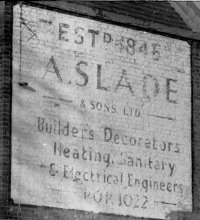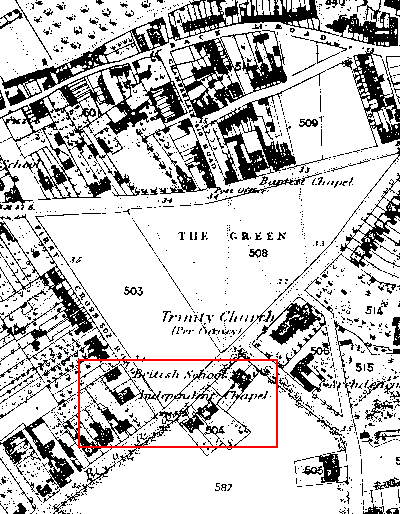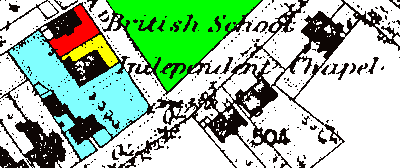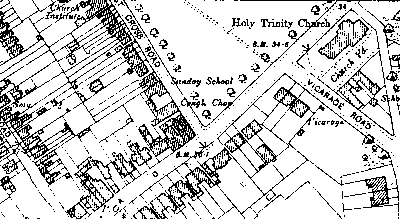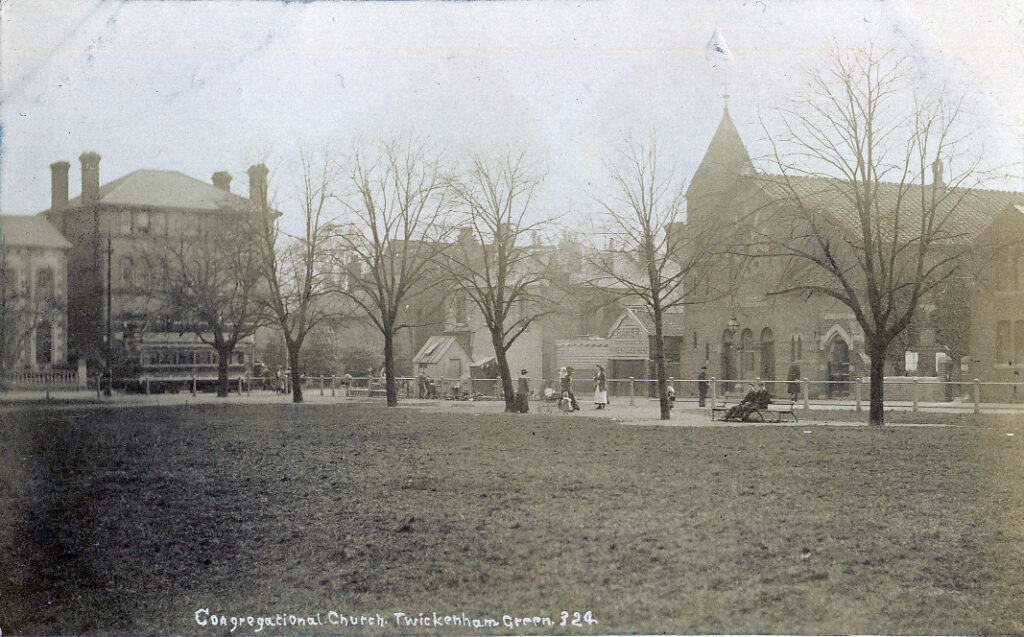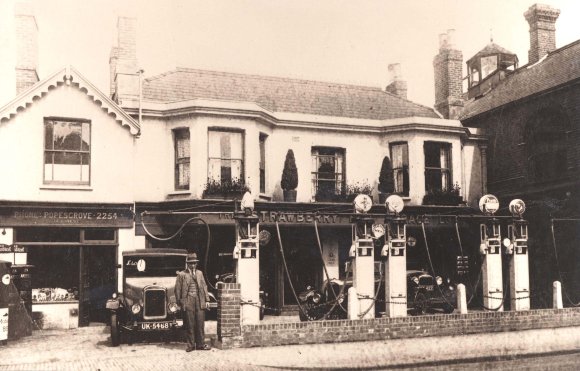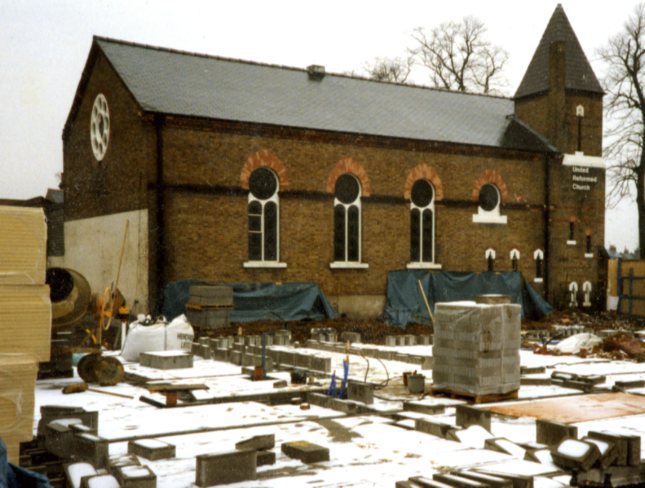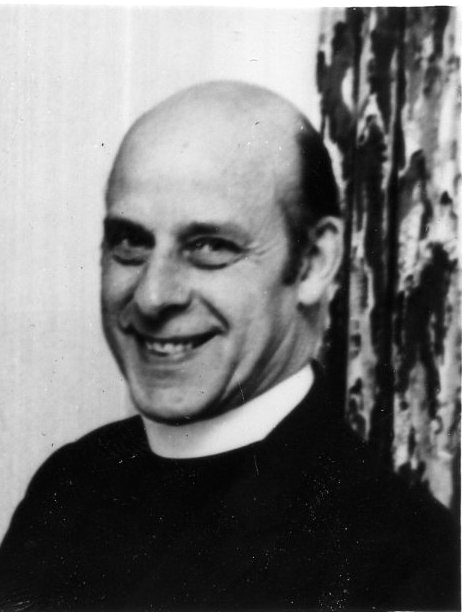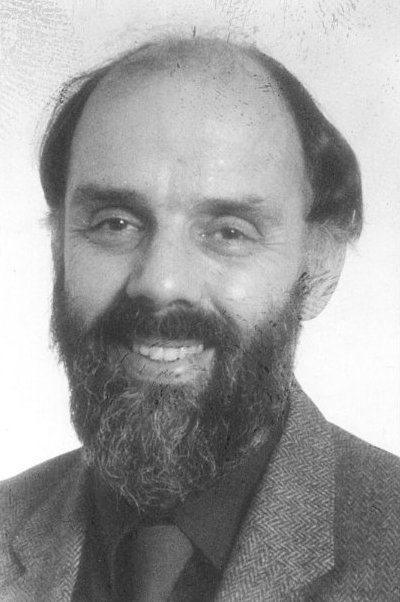Introduction and Prologue 1856-57 1858-59 1860-61 1862-67 1868-80 1881-86 1887-1903
1858
- Jan 3: … I have made out all my Bills and sent most of them out.. I find I stand very well with regard to my temporal affairs. The year has been on the whole prosperous. Bless the Lord for his mercy and goodness…
- Jan 9: Have been very uncomfortable respecting the state of affairs at our chapel. Things are not going on well. We have some stumbling blocks that want removing. A man plays on a bass which has driven nearly all the congregation away by his discordant sounds and yet he still persists in the annoyance… …
- Mar 15: The last month has been a neglectful one for writing not because I have not had time but it has been for want of inclination… Sometimes I have been doubtful when Business has been slack – But to the righteous there ariseth light in darkness. Such has been the case with me. Business is again become brisk… …
- Apr 2 [Good Friday]: Busy – had to be at business a part of the day. Had old Mr & Mrs Hunter to tea & supper with us, had a good time.
- Apr 4: I feel very unwell. Have a bad cold. Did not much enjoy the morning service.
- Apr 16: Have this day sent my first letter to Br. Hunter in Australia…
- Apr 19: Herd Mr Studley preach from Job… Did not enjoy the service on account of H.Baker’s unearthly sounds on the bass – that man is an enemy of the cause of Christ or he would not persist in doing so in opposition to the whole congregation. I have resolved this morning to countenance it no more… …
- May 2: …The week past has been a busy one, having had on several extra workpeople. I feel my responsibility to be great May the Lord help me…
- May 7: I have this day got my Lease granted & signed, which I hope will be all for the best. Have had a trying day. Business is very urgent. I find it a bad thing to be in the hand of lawyers. A most severe taste to meet their demands. I trust that my Children when grown up will try to avoid them. …
- May 16: Cast down – but not destroyed. I have severe trials in my business. Having got my lease settled, I find the payments are very heavy, but in looking over my books, I find I have sufficient to pay all, and about 60£ left. Only my money is out, but if my creditors will have a little patience, I shall (by God’s blessing) get on very well. This is the most trying year I have experianced, since I have been in business…
- June 20: To day my daughter Maria has arrived from Wincanton. She is about to stay a month with us…
- July 10: Business is very trying… I have been absorbed of late so much in business that my religion has become deadened and cold…I have but little regard for the good of this word – as I know it is uncertain – but duty is to me an absolute necessity as I have a family of 5 depending on me.
- July 22: My daughter Maria has left us this morning for Wincanton after a visit of 5 weeks… Her behaviour here alas has not been what I could wish… But when I remember the people that has had the care of her training – they are not better than heathens, never holding family prayers – or yet manifesting even the outward sign of religion, it would be a folly in me to expect grapes from thorns – or figs from thistles… …
- Aug 29: …This last week I have been cast down. Business has been dull. I have also had some trials – unprincipalled customers to deal with. But Glory be to God he has again made a move in business – it is he that does all this. The man of the world would laugh at this idea. They say do not the ungodly prosper. We say yes they do. And this only proves their ingratitude… …
- Sept 25: …We are very slack, shall be obliged to shorten hands unless something comes in… Have just concluded my letter to my friend Hunter in Australia.
- Sept 31 [?]: Went to Brentford with my men & apprentice to the County Court as plaintiff – G.Score Defendant. Amount, ballance of bill £5.4.7d. Got the full amount and my expences. Dick Claridge, W.Gaylor, and A.Bullie from London swore false, Score swore false, but God gave me the victory truth prevailed. Cost Score £10.17.6. Got home all right.
- Oct 1: Fixed Mr Weale’s bookshelves & horse. Went to London. Saw Mr Grant about Poplar Villas. Got his promise of work. Went to Mab’s in St Mary Ave and bought 2 look glasses. Sent to Nightingales for 1cwt of cotton flock price 9/-. Feel happy in mind, thank God. Understand Messrs Baker & Cogswell are taken of the ???, as not fit for the office. Engaged to repair a soffa for Dr Diamond (Twickenham House) for 25/-. Bought 3 Hair mattresses for 30/-. Sold Miss Jackson bookshelves.
- Oct 2: Rose at 6 o’clock. Made 2 mattress’s Miss Proby. Have been working all Day. Paid my 2 men and 2 boys this evening and glad it is Saturday night. Mr Burchett called on me to day. He was one of the jury on Scores’s Job. He congratulated me on my success. But I attribute it to God and not to man. I feel unwell this evening. …
- Oct 4: Sent 2 tables to Mr H.Harris, took two in exchange. Paid Claridge 1/6 settled with him.
- Oct 5: Made Mr Brown a money box and fitted contributn box at Independt chapel. Had Mr Wiltshire to dinner
- Oct 6: Worked at the chapel. Settled Score’s acct with Mr Paxton. Trusted of receiving £6.5.7, only received £4.6.0. The lawyers took the rest – went to singing class in the evening. …
- Oct 9: Finished Mr Brown’s oak box. Sold Mrs Loader 5 chairs. Visited Mrs Robertson for my Acct. She promised to pay next month. Paid my men & closed my books, and pray that I may close the week as I am tired of it… …
- Oct 14: Saw Mr Nicholls. Agreed to make a counter for 30/- and some old ?…
- Oct 16: Worked in the shop all day. I have now joined the instrumental class at the Archdeacons School. Had some friends this evening to music. There are 2 more upholsterers shops opened in the village. But what care. To the Lord is my stay, in him do I trust. Mr Wakely promised the rent due at Michalmas. Worked in shop all day and settled with my men & cleared my books.
- Oct 23: Saturday evening. The week past has been a busy one. Wakely has paid up his rent, and I have signed an agreement to let the house for 3 years, and a promise of 3 years further at the same rent of £25 per annm. if required. We have sold a good many things out of the shop this week and received ready money. I have several small orders in so that I am rather busy… I feel rather asthmatical now the winter is coming on…
- Oct 30: Saturday evening again and I have neglected my Diary all the week. I have been to London twice this week. Tuesday evening Sold Mr Brown a look’g glass & a good towel horse & took order for a mabl. wash stand £5.5.0. Friday recd. an order from Mrs Grant for some bedroom furniture… Tweed has been out on the drink … Woollet has made over time. Bill has been a week making a 3ft. 6in. Deal chest of drawers. To day I had in 3 dozn. chairs. I am not well. Have a bad cold and cough…
- Nov. 6: Saturday evening. This has been a very busy week. We have all been working over time. Have sold a great many things and have a good deal of work in hand… …
- Nov 25: My man Tweed is about to leave having spoiled my work through drunkenness. Richard Pond from Wincanton is about taking his place. The more business I have the more are my anxieties & troubles…
- Dec 13: Have been very unwell this last fortnight – Have my winter complaint bad cough – what is worse I have been declining spiritually… Business is brisk for the time of year. Richard Pond, my old master’s son is come to work for me. I hope he is a thoughtful young man. May I have grace to set a good example before my men & boys… Went to London last saturday, paid Harris £20. Paid Loaders and several others. Thank God I owe very little, while I am owed a good deal. This has been a prosperous year, Bless the Lord…
- Dec 29: The old year will soon expire… Christmas day my family and myself were quite to ourselves. We had a piece of roast beef, a goose & plum pudding – a good old english dinner. Sent poor old Mr Wiltshire a dinner. The poor soul is now to feeble to walk up and dine with us being in his eightyeth year. Pond has been ill. I have been ill myself but bless God both myself & family are well at the presant…
1859
- Jan 23: Business has been trying, having met with selfish, dishonest customers. But this I know is the common trial of every honest minded man… I have been pretty fortunate in both receiving and paying of my debts. Bless God I have cleared of all my last years accounts and have a few pounds left to carry on my business. Things at the presant look gloomy… but both my men as well as myself put our trust in God…
- Feb 1: Went to the County Court as witness about some gravel – Got much abused by a son of Satan because I would not pervert the truth, but bless God, he gave me the grace to bear it patiently. Work is good for the season. We are employed on full time.
- Feb. 6: To day is my birthday. 42 years ago at about 3 o’clock in the morning I first saw the light of heaven. When I look back and see the goodness of God to me… Once in my life, when about 28 years of age, I was laid ill for 11 weeks in London when I was a stranger and had no friends (except her who had been the companion of my youth – and is now in Heaven). Yet he supplied our wants – but it seems a mistery to one how we managed to exist…
- Feb 11: Wrote to Mrs Robertson for the amt. of her a/c which has been owing 8 months after due. Offered to take the goods back in part payment – Herd a student preach last evening. Felt encouraged at hearing the word.
- Feb 11?: Mrs Robertson surrendered up the bedsted and lookg. glass. She now owes me on my a/c £1.1.0 and the loan of the goods for 28 weeks Saturday…
- Feb 20: Received a letter from Mr Hunter in Australia. He desires an interest in the prayers of his friends, being straitened in his circumstances – he tells me he is made class-leader, in the St Kilda circuit. The ways of providence seem to me strange… Herd Mr Thos. Jackson preach and was much blessed under his sermon.
- Feb 21: The past week has been a busy one. I am furnishing No. 1 Apsley Cottage, and have the work in hand.
- April 10: The last week I have been very unwell. The weather has been very changeable. On the 29 of March we had 30 Degrees of frost, and on the 5th of April we had the glass up to 84 in the sun & wind. It has tried my weak frame very much. Yesterday I sent a letter to Mr Hunter in Australia. I bless God for sparing me and my family.
- On the 29 of March the Powder Mills blew up, sending 7 poor souls into eternity in a moment. It has broken a great deal of glass in Twickenham & neighbourhood. We thought the whole place was coming down – went on Wednesday and saw R. Claridge. He is under the treatment of Dr Ramadge (the man that once saved my life). Poor Claridge is dark as a millstone. I pray God will open his eyes before it is too late.
- April 22: The last week has been a busy one. Have sold a good deal, and have bought a house of furniture, for which I paid to much. But it is better to give than to take. I have no doubt but God will bless honest endeavours… I have received, at last, a letter from my brother in Australia – Jacob tells me that Isaac is married and living in Melbourne. I trust and pray that God will convert this soul.
- April 23: Have purchased Mr Litchfield’s furniture for 56£ – This last fortnight have sold 40£ worth… To morrow is the first of May and by God’s blessing I intend going to the meeting in Exeter Hall and devote one day to the service of my Master…
- May 13: This evening I have been looking over my acounts and I find I stand well – the profits of goods sold out of the shop this last 5 weeks amount to 23£, beside we have been busy in work. How good God is to me…
- May 22: …We have a plenty of work. My men are busy. This last week we have made some forms for the Teddington friends. They have the students come to preach to them – as yet they have only a barn for their preaching place. They are trying to get up a chappel. May the Lord bless them…
- July 1: To day – or rather this evening we have been visited with a terrible Thunderstorm… The rain fell in torrents to the depth of 8 inches – God in his goodness has spared both me and mine. May my heart be truly grateful to him for it. I have again been enlarging my premises in the yard. I have now better warehouse room than I had.
- July 2: Mr Spurgeon’s Sermons have set my mind working. I used to denounce the Calvin doctrine but I begin to see there are a great many things in it when tested by personal experiance – (without prejudice) that my mind must submit to… …
- July 23: 23 July. Left Twickenham for one week. Went to Upton Noble to see my dear mother & friends. Got as far as Allifield farm near Witham Friary – and was obliged to seek shelter from a heavy thunderstorm – which kept me prisoner for 2` hours with no one to speak to. Even the pigs and ducks sought for a more secure shelter. The electric fluid set fire to a house at Wanstrow which was burnt down. Likewise two at a place called Pitcomb near Coercreech – Went to Upton Chapel on the Sunday 24th. …
- Aug 7. …Received a newspaper from my friend Hunter in Australia. 27. The last fortnight has been a time of trial both with business and in spiritual matters as well. Business is very slack and has been so for some weeks past. One of my men (Pond) is about leaving me. I am sorry to part with him but cannot find him employment any longer. But when I look back for the last near 8 years since I have been in business… I do not despair but simply trust in my heavenly father…
- Aug 29: To day I have the order to repair all Apsley cottages (now 1-29 The Green), 15 in number (Mr Goatley surveyor). The last 5 weeks has been a time of much slackness. My men have been loosing time. I have an order for a good 3 door wardrobe for Mr Brown – so that matters have taken a turn. All this through the goodness of God… …
- Sept. 5: I have now some heavy orders on hand… I have the contract for repairing all Apsley cottages. The amount of contract is £375.10.0 and I trust by his Guidance it will not be a bad job – I have also a wardrobe price £25.0.0 which will be a good job…
- Sept. 16: This morning herd the Rev G. Ingram preach – felt very happy – was much encouraged under his sermon. Feel assured my presant situation is assured by God…
- Oct. 2: Business has occupied most of my thoughts of late – having been very busy. I am progressing favourably with the cottages although it is a severe trial to deal with so many tempers. The new preachers are come to the circuit – I have herd them both preach – But have not met in class with them. My mind has been in an unsettled state of late about church matters – and I know not if I shall meet in class again. If my leader gives me my ticket I shall do so, if not I shall decline it…
- Nov. 6: The news both from America, Pretoria, Scotland, and in the north of England is very encouraging to the Christian… So many have been converted in Ireland that the gin palaces & theatres are obliged to close and some of their owners are savingly converted to Christ…
- Nov 6: This last week has been a rough one. The weather has been unusaly rough. Much damage has been done both on sea and land and many lives lost. My Apsley cottages are nearly finished, and right glad I shall be when the matter is settled as the tenants have given me more trouble than any job I ever had before… I am thankful for work, but not for such evil disposed persons as I have to contend with. Mr Cox at The Poplars is giving me a deal of trouble. After doing his work and trying to oblige him, he is not willing to pay me. We have scarcely any work in at the presant – I know not what to find my men to do. But if God sees proper to send me employ for them, they will stay with me, if not he will provide them something else… I met in class last Wednesday and had a blessed time. My Daughter Maria was married – I believe the 9th of last month viz. (October) but she has never written to me. Her mind, I am sorry to say, has been poisoned against me by her grandmother Vining… but the time may come when she may feel different…
- Dec. 18:. …This morning I am in good spirits… Things at the presant are going on well. Business is Favourable for the season. …
- Dec 27. 2 day at half past 2 o’clock My son Isaac was born. Should he live I shall christen him after his uncle in Australia.
Introduction and Prologue 1856-57 1858-59 1860-61 1862-67 1868-80 1881-86 1887-1903
